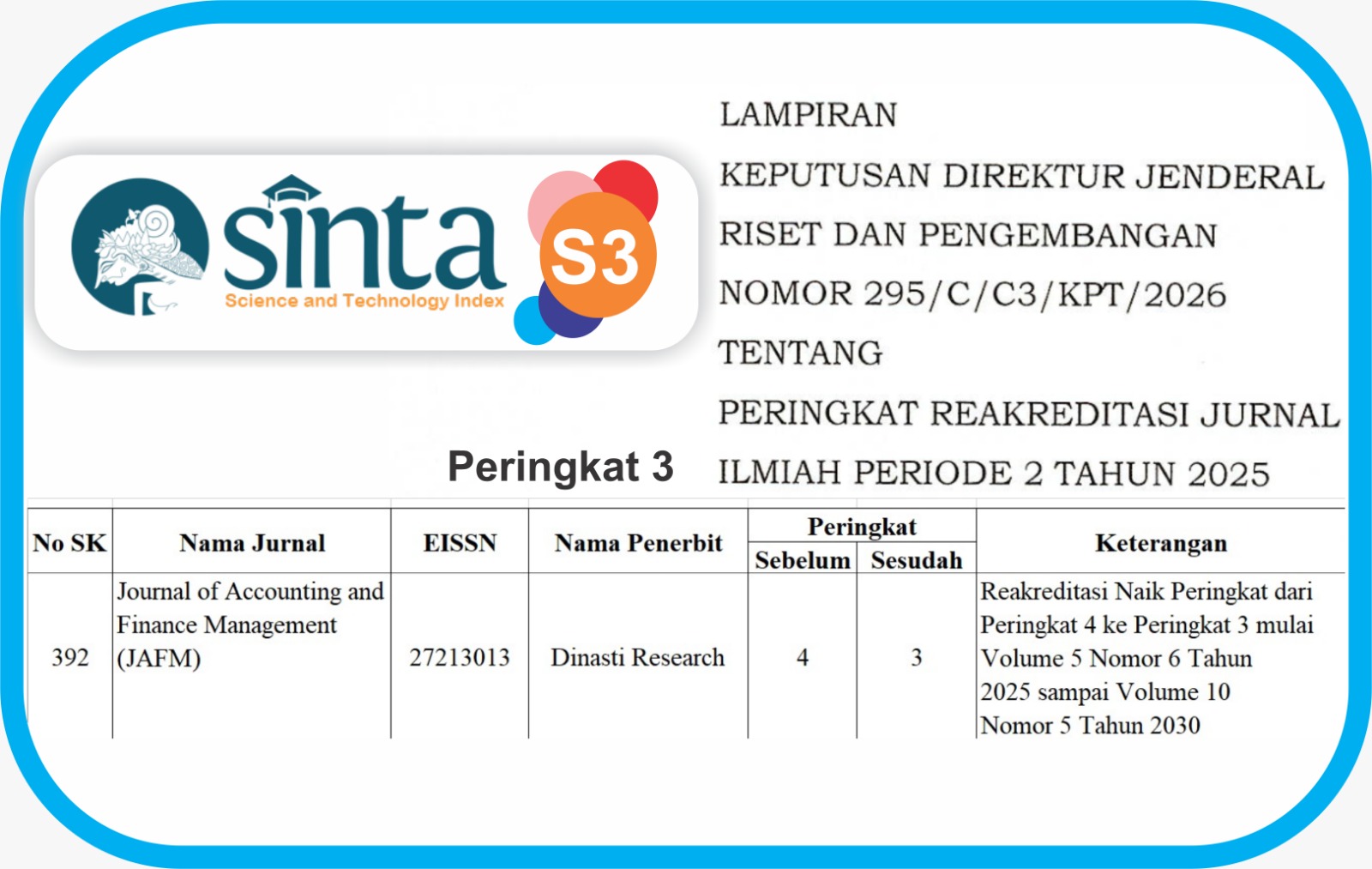Analysis of Factors Influencing Student Financial Management
DOI:
https://doi.org/10.38035/jafm.v5i4.796Keywords:
financial literacy, financial management, self-confidence, student, quality of financial learningAbstract
Financial difficulties are not always caused by the influence of income, but are also influenced by errors in managing finances, for example not planning a financial plan. There are many factors that influence students' financial management behavior. The purpose of this study is to analyze three factors that influence students' financial management, namely financial literacy, self-confidence and the quality of financial learning. The research method used is quantitative descriptive with a population of 83 students of the Accounting Department of the State Polytechnic of Malang in 2023. The results of the study show that financial literacy, self-confidence, and the quality of financial learning have a positive effect on students' financial management, both partially and simultaneously.
References
Albertus, Setya Stanto, Leksono, Ari Wahyu & Vhalery, Rendika. (2020). Pengaruh Literasi Keuangan dan Lingkungan Kampus Terhadap Manajemen Keuangan Pribadi Mahasiswa. Reseacrh and Development Journal of Education.
Ayu Krishna, dkk. (2010). Analisis Literasi Keuangan di Kalangan Mahasiswa dan Faktor-Faktor yang Mempengaruhinya. Proceeding of the 4th International Conference on Teacher Education; Join Conference UPI & UPSI: 552-560.
Bandura. (2006). Toward a Psychology of Human Agency. Perspectives on Psychological Science, 1(2), 164-180.
Busyro, Wahyi. (2019). Pengaruh Literasi Keuangan terhadap Perlikau Pengelolaan Keuangan Mahasiswa. Jurnal ISLAMIKA, Vol. 2 No. 1.
Chen, H. & Volpe, R. P. (1998). An Analysis of Personal Financial Literacy Among College Students. Financial Services Review, 7(2): 107- 128.
Erika, Vira. (2019). Pengaruh Literasi Keuangan terhadap Pengelolaan Keuangan Prodi Manajemen Fakultas Ekonomi dan Bisnis UMSU. Universitas Muhammadiyah, Sumatera Utara.
Farrell, L., Fry., T., R., L. & Risse, L. (2016). The Significance of Financial Self-Efficacy in Explaining Women’s Personal Finance Behavior. Journal of Economic Psychology, 54, 85-99.
Lusardi, A & O.S. Mitchell. (2014). The Economic Importance of Financial Literacy: Theory and Evidence. Journal of Economic Literature 2014, 52(1), 5±44.
Lusardi, A., & Mitchell, O. S. (2007). Baby Boomer Retirement Security: The Roles of Planning, Financial Literacy, and Housing Wealth. Journal of Monetary Economics, 54, 205-224.
Margaretha, Farah dan Pambudhi, Reza Arief. (2015). Tingkat Literasi Keuangan pada Mahasiswa S-1 Fakultas Ekonomi. JMK, Vol. 12, No.1.
Muntahanah, Siti, dkk. (2021). Literasi Keuangan, Pendapatan dan Gaya Hidup Terhadap Pengelolaan Keuangan di Masa Pandemi. Jurnal Ilmiah Universitas Batanghari Jambi, 21 (3).
Nasihah, Dzurrotun & Listiadi, Agung. Pengaruh Pembelajaran Akuntansi Keuangan, Literasi Keuangan dan Kontrol Diri Terhadap Perilaku Keuangan Mahasiswa Fakultas Ekonomi Universitas Negeri Suraya. Jurnal Pendidikan Akuntansi, 7 (3).
Nuraprianti, D., Kurniawan, A., & Umiyati, I. (2019). Pengaruh Etika Uang (Money Ethics) Terhadap Kecurangan Pajak (Tax Evasion) dengan Religiusitas Intrinsik dan Materialisme sebagai Variabel Pemoderasi. Jurnal Ilmiah Akuntansi dan Keuangan, 1 (2), 161 – 179.
Nurlaila, Ila. (2020). Faktor-faktor yang Mempengaruhi Mahasiswa dalam Mengelola Keuangan. Platform Riset Mahasiswa Akuntansi, Vol. 1,
No. 1.
Pirari, W., Siski. (2020). Pengaruh Literasi Keuangan dan Gaya Hidup terhadap Pengelolaan Keuangan Mahasiswa Prodi Manajemen Universitas Muhammadiyah Sumatera Utara. Universitas Muhammadiyah, Sumatera Utara.
Pradnyawati L. A. Siwi. (2020). Pengaruh Literasi Keuangan terhadap Pengelolaan Keuangan Mahasiswa Program Studi Manajemen Universitas Pendidikan Ganesha.Universitas Pendidikan Ganesha, Singaraja.
Puspita, G., & Isnalita, I. (2019). Financial Literacy: Pengetahuan, Kepercayaan Diri dan Perilaku Keuangan Mahasiswa Akuntansi. Owner: Riset dan Jurnal Akuntansi, 3(2), 117-128.
Ramalho, T. B., & Forte, D. (2019). Financial Literacy in Brazil–Do Knowledge and Self-Confidence Relate with Behavior?. RAUSP Management Journal, 54, 77-95.
Rotter, J. B. (1966). Generalized Expectancies for Internal Versus External Control of Reinforcement. Psychological monographs: General and applied, 80(1), 1.
Schunk, Dale., H. (2012). Learning Theories: An Educational Perspective, 6th Edition. New York: Pearson Education, Inc.
Sugiharti, Harpa & Maula, Kholida Atuyatul. (2019). Pengaruh Literasi Keuangan Terhadap Perilaku Pengelolaan Keuangan Mahasiswa. ACCOUNTHINK: Journal of Accounting and Finance, 4 (2).
Tangney, J. P., Baumeister, R. F., & Boone, A. L. (2004). High Self-Control Predicts Good Adjustment, Less Pathology, Better Grades, and Interpersonal Success. Journal of Personality, 72(2), 271–322.
Yushita, Amanita Novi. (2017). Pentingnya Literasi Keuangan bagi Pengelolaan Keuangan Pribadi. Jurnal Nominal, VI (1).
Downloads
Published
How to Cite
Issue
Section
License
Copyright (c) 2024 Fathimatus Zahro Fazda Oktavia, Dharmawan Iqbal Akbar, Farisa Nur Maula

This work is licensed under a Creative Commons Attribution 4.0 International License.
Authors who publish their manuscripts in this journal agree to the following conditions:
- The copyright on each article belongs to the author(s).
- The author acknowledges that the Journal of Accounting and Finance Management (JAFM) has the right to be the first to publish with a Creative Commons Attribution 4.0 International license (Attribution 4.0 International (CC BY 4.0).
- Authors can submit articles separately, arrange for the non-exclusive distribution of manuscripts that have been published in this journal into other versions (e.g., sent to the author's institutional repository, publication into books, etc.), by acknowledging that the manuscript has been published for the first time in the Journal of Accounting and Finance Management (JAFM).



























